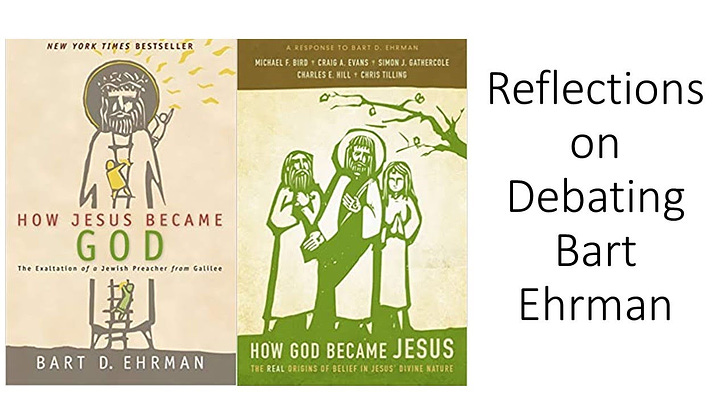Book # 13 featured me leading a team of scholars in a project directly engaging with Bart Ehrman’s own volume about the divinity of Jesus.
I was at SBL in 2013 and I saw the promo for Ehrman’s newest book, How Jesus Became God, and I instantly knew two things.
First, the main argument would be, “Once I was a stupid fundamentalist who believed Jesus was God, but then I learned the truth that the scholars know but Christians don’t, so let me tell you the unsettling truth about Jesus.” Coz that is Ehrman’s modus operandi.
Second, I instantly knew that as soon as Ehrman’s book came out I would be getting a flurry of emails from ex-students, Christians in Muslim countries, people in my own church, and all and sundry asking if anything Ehrman said was true.
But then I thought, “Wouldn’t it be good to get on the front foot and have a response out at the same time that Ehrman’s book comes out.”
So I concocted a plan to write a response to Ehrman’s book that would come out at exactly the same time that Ehrman’s book did! Zondervan liked the idea and it worked because HarperOne and Zondervan are both owned by Harper Collins, and thanks to the generosity of Ehrman and his publisher, we got a pre-pub copy of the book to write a response to. From pitch to publication was 100 Days which I think was a Zondervan record!
So I recruited a top team with Simon Gathercole, Craig Evans, Chris Tilling, and Charles Hill, and together we wrote a response to Ehrman’s book that came out the same time as Ehrman’s book.
Publishers Weekly had a funny piece on how Harper Collins had a bet both ways on the divinity of Jesus.
Here’s the blurb:
In his recent book How Jesus Became God: The Exaltation of a Jewish Preacher From Galilee(March 2014) historian Bart Ehrman explores a claim that resides at the heart of the Christian faith— that Jesus of Nazareth was, and is, God. According to Ehrman though, this is not what the original disciples believed about Jesus, nor what Jesus claimed about himself. The first book length response to this latest challenge to Christianity from Ehrman, How God Became Jesus features the work of five internationally recognized biblical scholars. While subjecting his claims to critical scrutiny, they offer a better, historically informed account of why the Galilean preacher from Nazareth came to be hailed as “the Lord Jesus Christ.” Namely, they contend, the exalted place of Jesus in belief and worship is clearly evident in the earliest Christian sources, shortly following his death, and was not simply the invention of the church centuries later.
I did a lot of PR for this project, I wrote a piece for CT, where I gave a biographical account of my journey into Jesus-loving scholarship:
Some have great confidence in skeptical scholarship, and I once did, perhaps more than anyone else. If anyone thinks they are assured in their unbelief, I was more committed: born of unbelieving parents, never baptized or dedicated; on scholarly credentials, a PhD from a secular university; as to zeal, mocking the church; as to ideological righteousness, totally radicalized. But whatever intellectual superiority I thought I had over Christians, I now count it as sheer ignorance. Indeed, I count everything in my former life as loss because of the surpassing worth of knowing the historical Jesus who is also the risen Lord. For his sake, I have given up trying to be a hipster atheist. I consider that old chestnut pure filth, in order that I may gain Christ and be found in him, not having a CV that will gain me tenure at an Ivy League school, but knowing that I’ve bound myself to Jesus—and where he is, there I shall also be.
You can read other articles and pieces about the book over at Bible Gateway and ABC Religion and Ethics.
FYI, I have two more books on the divinity of Jesus coming out NOW.
Jesus among the gods: Early Christology in the Greco-Roman World - releases 15 October.
In partnership with Bart Ehrman and Robert Stewart: When Did Jesus Become God?: A Christological Debate - releases 25 October.
I’ve also done a video reflecting about the debate I did with Bart Ehrman several years ago:
Hey, if you are a paid subscriber, hit me up with your questions on the divinity of Jesus!





I listened to that incredible debate when we were doing a series on the Trinity at church recently. Ehrman had me rattled- till you took the platform. Thanks for putting in this great effort.
I have questions: How could Jesus be one person and his humanity not know what his divinity would "surely" know? Does the divine Jesus not know when he will return? Has Jesus always submitted to the will of the Father and does submission in any way diminish His equality with the Father?